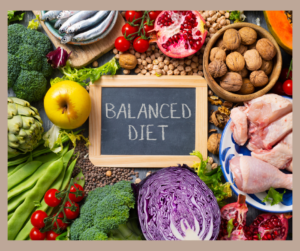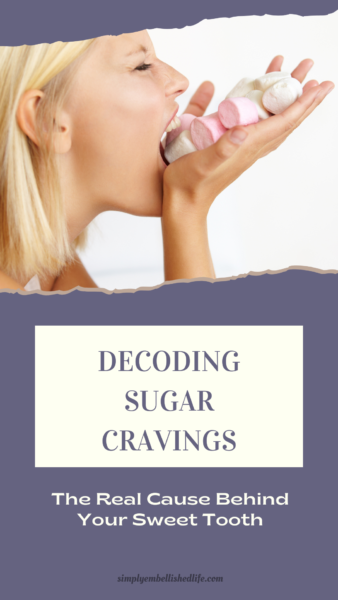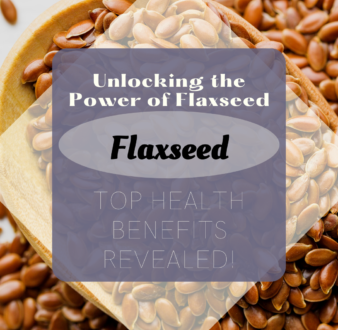Most of us know what we should be eating as part of a healthy diet, but sometimes that sweet tooth is just too strong to resist and we give into our sugar cravings more often than we’d like to. You might even feel guilty about it and think there’s something wrong with you because you don’t have the willpower to resist your cravings.
Wouldn’t it be easier if you just didn’t have those strong cravings in the first place, so you wouldn’t have to worry about how much willpower you have?
You might not even realize what’s causing your cravings. Sugar cravings can be influenced by a combination of physiological, psychological, and environmental factors.
Here are some key factors that can contribute to sugar cravings:
Blood Sugar Levels: Fluctuations in blood sugar levels can trigger cravings for sugary foods. When blood sugar levels drop, your body may crave quick sources of energy, which often come from sugary foods. The best way to avoid these fluctuations is to eat balanced meals that contain fiber, carbs, protein, and healthy fat. Also, try not to skip meals.
Hormonal Changes: Hormonal changes, such as those that occur during the menstrual cycle, pregnancy, or menopause, can lead to increased sugar cravings.
Stress: Stress can trigger the release of the hormone cortisol, which can increase cravings for sugary and high-fat foods as a way to provide comfort and temporarily relieve stress. Instead of reaching that sugary snack try relieving your stress in non food related ways. Take a walk, listen to some music, or take some deep breaths.
Emotional State: Negative emotions such as sadness, boredom, or anxiety can lead to emotional eating, where sugary foods are consumed to cope with these feelings. Instead of trying to cope using food, remember that it’s ok to feel your feelings and they will pass. It might be helpful to make a list of activities you can use to help the emotions pass more quickly.
Lack of Sleep: Sleep deprivation can affect hormones that regulate hunger and appetite, leading to increased cravings for sugary foods. Also, our inhibitions tend to be lowered when we’re tired, so we’ll be more likely to give into those sugary temptations.
Dietary Factors: Consuming a diet high in refined carbohydrates and sugars can lead to a cycle of cravings, as these foods can cause rapid spikes and crashes in blood sugar levels. Focus on eating balanced meals and snacks to keep levels more steady.

Microbiome: The gut microbiome plays a role in influencing food preferences, including cravings for sugary foods. Certain gut bacteria may release compounds that affect your brain’s reward centers and influence your cravings. If you eat a lot of added sugar these bacteria will thrive and when you try to stop consuming sugary foods/drinks you will experience stronger cravings initially as these bacteria fight to survive.
Addictive Properties: Sugar can trigger the release of dopamine in the brain’s reward system, leading to feelings of pleasure and reinforcing the desire for sugary foods. Finding other things that make you happy that aren’t food related is the key to not relying on food for pleasure.
Food Advertising and Availability: Exposure to advertisements for sugary foods and easy access to these foods in your environment can increase cravings. It might be impossible to avoid all food advertisement, but you can control the kinds of foods you buy and have in your home. Make sure there are healthy foods readily available, so you don’t feel the need to go for the less nutritious convenience foods.
Social and Cultural Influences: Social situations, cultural practices, and peer pressure can influence your food choices and cravings, including cravings for sugary treats. These can be unavoidable, but being mindful about what and why you’re eating is the best way to take control. Remind yourself that you are not required to eat/drink anything just because other people are. Also, don’t go to social gathering that involve food on an empty stomach or you’ll be more likely to give into the sugar cravings.
Past Dieting or Restriction: Restrictive diets or periods of food deprivation can lead to intense cravings for forbidden foods like sugary treats. Telling yourself that you can’t have something is a good way to trigger an increased want for that thing. Remind yourself that you are allowed to have anything your want, but you have control over what you choose to have.
Genetics: Genetic factors can influence how your body responds to sugar and how sensitive you are to its taste, which can impact your cravings. You can’t change your genetics, but you can help relieve symptoms considering the factors listed above.
Conditioning: Your brain can associate certain activities, situations, or emotions with sugary rewards, leading to cravings in those contexts. It might take some time and effort, but you can recondition yourself to not associate food with those situations. You can start by not using food as a reward, if that’s something you tend to do. Find other ways to reward yourself for your achievements that don’t counteract your health goals.

Dehydration: Thirst is often mistaken for hunger. It’s common to believe we’re hungry and reach for a sugary snack instead of having a glass of water, even when that’s what our body really needs. Drink some water first and then see how you feel.
Artificial Sweeteners: These sweeteners are much sweeter than natural sugar and they trick our bodies into thinking we’re consuming sugar. The trigger insulin release and increase our appetites. They also contribute to chronic inflammation which affects the gut biome and those off our hormones. Avoid artificial sweeteners when possible.
There’s No One Way to Stop Sugar Cravings
Managing sugar cravings involves a holistic approach that addresses both the underlying causes and the immediate triggers. Strategies include adopting a balanced and nutritious diet, managing stress, getting enough sleep, practicing mindful eating, staying hydrated, and finding healthy ways to cope with emotions.
If sugar cravings are particularly intense or disruptive, it may be helpful to seek support. If you’d like help creating a more personalized plan to crush your sugar cravings, click below to book a call.






